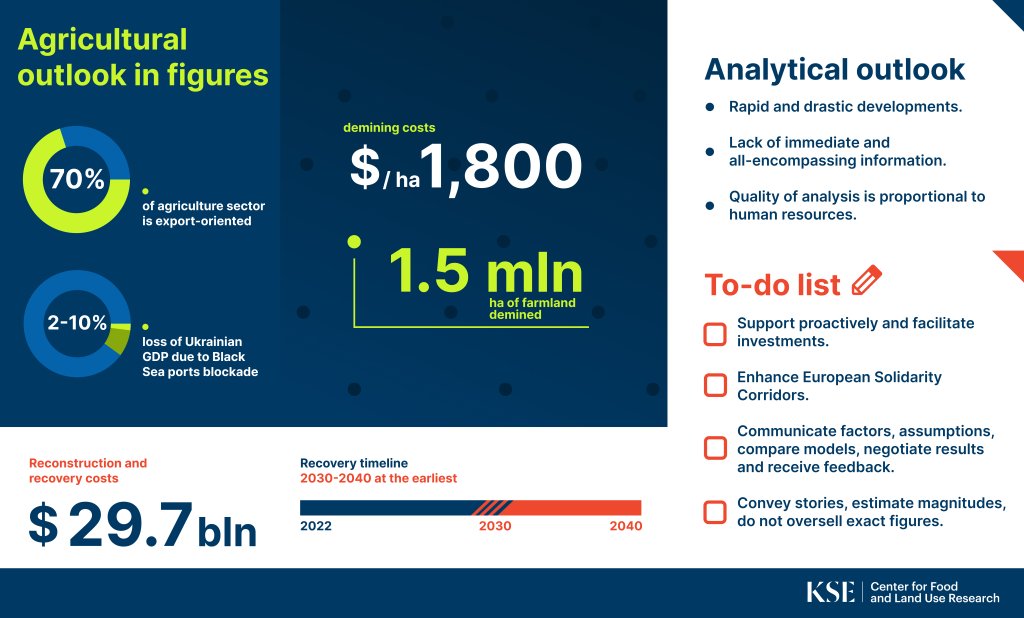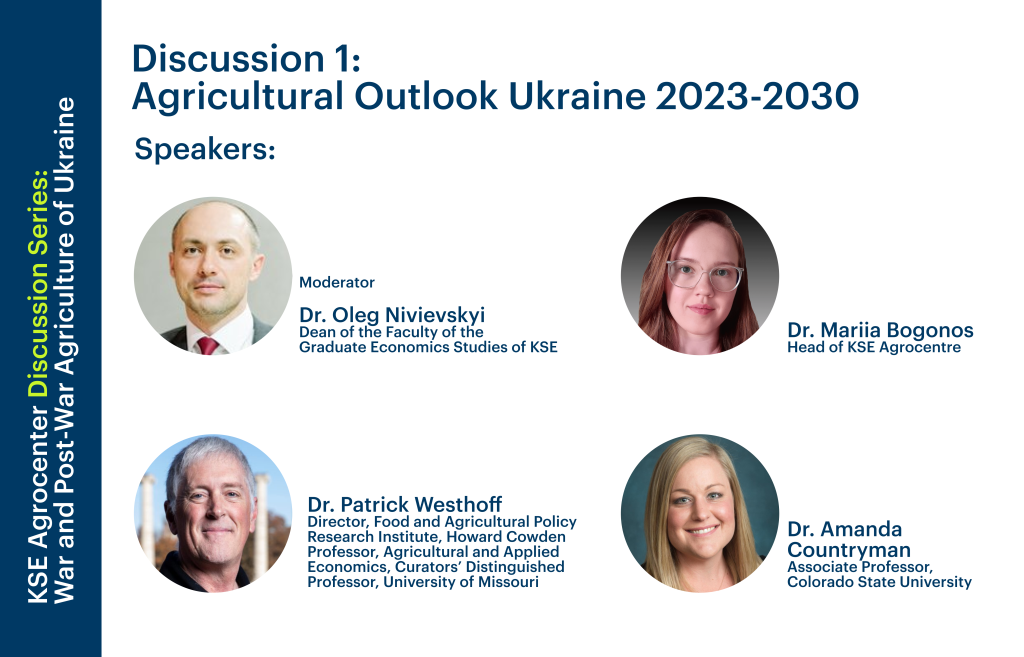- Kyiv School of Economics
- About the School
- News
- KSE Agrocenter Discussion Series Discussion 1: Agricultural Outlook Ukraine 2023-2030
KSE Agrocenter Discussion Series Discussion 1: Agricultural Outlook Ukraine 2023-2030
7 December 2023

On November 27, 2023, the Center for Food and Land Use Research at the Kyiv School of Economics (KSE Agrocenter) organized the seminar «Agricultural Outlook Ukraine 2023-2030».
The event was dedicated to the projections of Ukrainian agricultural sector development. In addition, the aspects of economic analysis in this field were discussed.
The opening remarks to the whole Discussion series were opened by Dr. Mariia Bogonos, Head of KSE Agrocenter. Dr. Bogonos emphasized that food production is not only about the business, but also a question of security. From the viewpoint of food security, the industry projections are not positive. In this respect, the permanent dialogue among the stakeholders regarding production forecasts and other aspects agricultural development in Ukraine is needed.
Natalia Shapoval, President of KSE Institute, gave contributory remarks to the opening of the Discussions, emphasizing the importance of the projecting different scenarios.
Main points:
• Ukraine demands the global rule of law and cooperation with the global West and South.
• The whole world needs stable commodity prices.
• The liquidity of many Ukrainian enterprises is crucial for surviving during the crisis.
Taras Vysotskyi, First Deputy Minister of Agrarian Policy and Food of Ukraine, introduced the audience to the aspects of the Ministry’s work and how it affects the food industry.
Main points:
• 70% of the agricultural sector is export-oriented.
• Human capital of the food production industry is affected by mobilization and relocations.
• 5 mln. ha of agricultural lands are demined. An essential part of productive land is still under occupation.
• The Ministry does comprehensive research of the origin, dynamics and the outcomes of the agricultural sector’s problems.
• The Ministry needs to consider the current fluctuations in the food production industry into its own strategy and to react to them quickly.
• Solutions from abroad to the current challenges are not always applicable to the agricultural sector, but can be adapted for use in Ukraine. Such adaptation can be accomplished by the industry’s stakeholders unanimously approving of some part of the foreign experience and reaching a consensus based on the other part thereof.
• A question of whether to recover the affected businesses as they have been before the invasion or to implement new agricultural practices and technologies thereto stands in front of the Ministry and a discussion on the matter is needed.
• The Ministry sees the need to assist the war survivors to recover the losses incurred by it. The current concern for the agricultural policy authority is the liquidity of respective businesses.
• The Ukrainian aspirations to become a member of the EU entail further commitments to follow and more rules of the game to adapt to.
Dr. Oleg Nivievskyi, Dean of the Faculty of the Graduate Economics Studies of KSE opened up the first Discussion of the Series with the notes on the forthcoming exchange of experience.
Main points:
• One can gain experience from understanding the rationale behind the decisions made to adapt to the previous challenges to the foreign agricultural sectors.
• The culture of evidence-based economic policy analysis is only developing in Ukraine. Kyiv School of Economics aims to improves Ukraine’s capacity thereto.
• In search for the solutions to the current challenges to the agricultural sector one should take into account not only the policies and market dynamics but also scientific developments.
• USA and EU are considered to be the benchmarks for analytics in the food production economics.
Dr. Patrick Westhoff, Director of Food and Agricultural Policy Research Institute at University of Missouri, introduced the audience to the challenges the analysts face in their predictions of the situation, what mindset they operate with, and which parts of this experience are applicable to the current Ukrainian context.
Main points:
• Forecasting of the agricultural sector is an extremely difficult process. Nonetheless, its results are as much important as they are hard to make.
• The current war situation of the Ukrainian agriculture is rather uncertain since the analysts do not know everything about it. They will never obtain all the information possible, but at least they can inform the stakeholders’ decisions to the greatest extent they are able to. In the meantime, the researchers should not claim their findings are exact and ultimately precise.
• The way COVID-19 affected the American food production sector shows the low predictability of future development of the sector. FAPRI later received answers as to what happened and how; however, they appeared to be for different reasons than first expected. The Institute continues to investigate developments in the agricultural sector caused by the pandemic.
• Regardless of what conclusions are drawn from the experience gained, when they are drawn to the best of the analyst’s ability, the results become vital to subsequent decision-making processes.
• In the process of scenario modeling, some factors of the agricultural sector retain their significance over time. For factors that have not stood the test of time, analysts adapt, revise or replace them with more important aspects.
• The immediate price spike caused by the war has been smoothed by Black Sea Grain Initiative (BSGI).
• Numerous aspects must be evaluated for the future. Due to time and resource constraints for forecasting, analysts must focus on the scenarios of greatest interest.
• Stochastic analysis, which is used in the United States for farmer compensations, is not useful for the Ukrainian context since the current situation here entails drastic changes to the production and exportation processes.
• There is an urge to seek other analysts’ experiences of attempting to model similar situations to the current one.
Dr. Amanda Countryman, Associate Professor at Colorado State University, presented the findings of scenario analysis conducted in collaboration with members of KSE Agrocenter regarding the effects of Black Sea Grain Initiative (BSGI) unilateral cancellation by RF on agricultural exports, on the economy in general, and on the population wellbeing across the globe.
Main points:
• During the research, a general equilibrium model for bilateral trade was used. The scenario modeling included assumptions on the European Union’s logistical assistance: whether the European Solidarity Lanes (ESL) are weak or strong.
• The ESL were introduced to supplement the BSGI, though these routes are less efficient.
• The effects of RF canceling the BSGI appeared to be not as negative as the researcher team expected. Exports directed to the MENA region appeared to be the most vulnerable. The processed food exports is expected to be replaced by the export of oilseeds and vegetables. Europe is seen as having to substitute the agricultural imports from Ukraine with the alternatives to the greatest extent. Due to the BSGI cancellation, Ukraine is expected to lose from 2% to 10% of GDP.
• Both Ukraine and Europe are better off with strong logistical support from the European Union.
Dr. Mariia Bogonos presented another study related to the prospects of agriculture, with an emphasis not on exports, but on domestic production. She also compared the Agrocenter’s findings with those of the Organization for Economic Cooperation and Development (OECD) and United States Department of Agriculture (USDA).
Main points:
• The Ukrainian agricultural sector’s reconstruction and recovery needs closely match the indirect losses incurred by the RF’s invasion into the country. The needs for long-term reconstruction and recovery investments are twice the size of the more immediate needs. The direct support should be proactive and support further investments.
• Agricultural producers bear an extremely heavy burden of demining with payback periods reaching the scale of a human generation. They have some sort of respite since the transportation costs have largely recovered from the initial invasion spike.
• The agricultural land market is still functioning despite the effect of the war on land availability.
• The Ukrainian agricultural producers are largely isolated from the European commodity markets, which is evident from the prices on their produce.
• The export volumes and prices are heavily reliant on respective production metrics.
• Livestock farming faces a worrying downsizing of herd and industry concentration.
• KSE Agrocenter’s modelling takes into account RF’s looting of produce and repossessions of equipment and buildings, but does not account for the financial support received by the farmers.
• The OECD’s forecasts for the Ukrainian agricultural sector output are closer to KSE’s proprietary ones, whilst the USDA’s ones are more pessimistic. In econometric model comparison, one should compare the assumptions and the minimums and maximums of the forecasts.
• The households with the greatest risks to food security are the ones closest to the frontlines, having female heads, having cohabitants with impairments, and being furthest from agricultural production.

